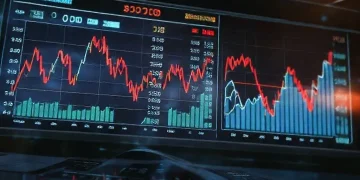Smart budgeting strategies for long-term financial stability

As estratégias de planejamento financeiro, como a criação de um orçamento, a utilização de tecnologia para monitorar despesas e a formação de um fundo de emergência, são fundamentais para garantir a estabilidade financeira a longo prazo.
Smart budgeting strategies for long-term financial stability are essential for anyone looking to secure their financial future. Have you ever thought about how budgeting can transform your spending habits? In este artigo, vamos explorar maneiras de otimizar suas finanças e garantir a segurança a longo prazo.
Understanding the importance of budgeting
Budgeting is a vital practice that paves the way for financial success. Understanding the importance of budgeting can lead to improved savings and better financial management. By creating a budget, you gain insight into your spending habits and identify areas where you can cut costs.
The benefits of budgeting
When you have a clear budget, it helps you set financial goals. Here are some benefits of maintaining a budget:
- Increase savings for future needs
- Control overspending
- Prepare for emergencies
- Achieve long-term financial stability
A budget serves as a roadmap for your finances. Without it, you may find yourself unaware of where your money is going. This lack of awareness can lead to unnecessary debt and stress.
How budgeting promotes financial awareness
Another key aspect of budgeting is that it promotes financial awareness. By tracking your income and expenses, you can make informed decisions about your finances. You start to see patterns in your spending that you may want to change.
For example, if you find that you’re spending too much on dining out, this insight can help you shift your habits. Small adjustments can lead to significant savings over time. The act of budgeting can also encourage you to prioritize your spending, ensuring that your money goes towards what truly matters to you.
Incorporating budgeting into your monthly routine is essential. Set aside time to review your budget regularly and update it as necessary. This practice will help you stay on track and adjust your financial goals as your circumstances change.
Key elements of an effective budget
Creating an effective budget involves various key elements that can help you manage your finances better. Understanding these elements is crucial for anyone looking to achieve financial stability.
Identifying your income
The first step in budgeting is to identify your total income. This includes not just your salary, but also any additional sources like freelance work or investment returns. Knowing your total income provides a solid foundation for all your budgeting plans.
Listing your expenses
Next, make a list of all your monthly expenses. This can be divided into fixed expenses, such as rent or mortgage, and variable expenses, like groceries or entertainment. Recognizing these expenses helps you see where your money is going.
- Fixed expenses: Rent, mortgage, utilities
- Variable expenses: Groceries, dining out, entertainment
- Periodic expenses: Insurance, property taxes
When you have a clear view of your expenses, you can determine areas for potential savings. This awareness allows you to cut unnecessary spending effectively.
Setting financial goals
Every budget should include clear financial goals. Whether you want to save for a vacation, pay off debt, or build an emergency fund, these goals give your budget purpose. When you set specific, measurable goals, you make it easier to stay committed to your budget.
Regularly review your financial goals to ensure they remain aligned with your needs and lifestyle changes. Adjusting your goals as necessary helps keep you motivated and accountable.
Lastly, monitoring your budget is essential. Track your progress and adjust your budget regularly to reflect changes in your financial situation. This practice ensures you stay on top of your finances and make informed decisions.
Tips for creating a sustainable budget

Creating a sustainable budget is essential for achieving long-term financial health. Here are some tips for creating a sustainable budget that can help you manage your finances effectively.
Start by tracking your expenses
The first step toward a sustainable budget is to track your monthly expenses. Use a spreadsheet or budgeting app to categorize different types of spending. By monitoring where your money goes, you can identify unnecessary expenditures and make adjustments.
Prioritize your needs and wants
It’s important to distinguish between needs and wants. Needs are essential expenses like housing, food, and transportation, while wants include non-essential items like luxury dining or entertainment.
- Make a list of your needs first.
- Identify the wants you can live without.
- Allocate funds for wants only after meeting your needs.
By prioritizing your expenses, you create a budget that reflects your true financial requirements. This strategy also reduces the temptation to overspend on items that are not necessary.
Set realistic goals
When creating your budget, set realistic and achievable financial goals. For example, aim to save a specific amount each month or pay off a particular debt. Having clear goals helps you stay focused and motivated.
Regularly review and adjust these goals as your financial situation changes. This flexibility ensures that your budget remains relevant and effective over time.
Another tip is to build in some flexibility. Life is unpredictable, and your budget should accommodate unexpected expenses. Consider having a small fund for emergencies, allowing you to deal with unforeseen circumstances without derailing your entire budget.
Using technology to track your expenses
In today’s digital world, using technology to track your expenses is easier than ever. Many tools and apps can help you manage your finances and stay on top of your budgeting goals. Leveraging these resources is a smart move for anyone wanting to achieve long-term financial stability.
Choosing the right budgeting apps
There are plenty of budgeting apps available that cater to different needs. Consider features, usability, and whether they sync with your bank accounts. Some popular options include:
- Mint: Offers expense tracking and budget planning tools.
- YNAB (You Need a Budget): Focuses on proactive budgeting and goal setting.
- EveryDollar: Simple interface for creating budgets and tracking expenses.
By selecting an app that aligns with your financial goals, you can streamline your budgeting process and enhance your financial awareness.
Linking your bank account
Many budgeting apps allow you to link your bank accounts and credit cards, making it simple to track your spending automatically. This feature saves time and provides real-time insights into your financial habits. You can easily see where your money goes and adjust your budget accordingly.
Utilizing alerts and notifications can help you stay aware of your spending limits. Set alerts for overspending in specific categories or reminders for bill payments. This approach ensures you are always informed about your financial status.
Regularly reviewing your tracked expenses can lead to powerful insights. By analyzing this data, you can identify patterns in your spending, which allows you to make informed decisions moving forward. You might discover areas where you can cut back to save more effectively.
Adjusting your budget for unexpected expenses
Adjusting your budget for unexpected expenses is a crucial skill for maintaining financial health. Life can be unpredictable, and having a plan for surprise costs helps you stay on track. Recognizing that these expenses will arise allows you to manage them effectively.
Identifying potential unexpected expenses
Start by identifying common unexpected expenses that may occur throughout the year. These can include:
- Medical bills that arise suddenly
- Car repairs after an accident
- Home maintenance issues like a leaky roof
- Job-related costs, such as travel or training
By anticipating these expenses, you can create a buffer in your budget to accommodate them without derailing your financial plans.
Creating an emergency fund
One effective way to adjust your budget for unforeseen expenses is to establish an emergency fund. This fund acts as a safety net, providing the cash you need when life throws you a curveball. Aim to save at least three to six months’ worth of living expenses in this fund.
Regular contributions to your emergency fund can make a significant difference. Set a specific amount to contribute each month, so you build this fund gradually over time.
Regularly reviewing your budget is essential as well. Make it a habit to check in on your financial situation at least once a month. During this review, assess your spending patterns and whether your budget is still meeting your needs. If you notice increased spending in certain areas, adjust those categories to free up funds for unexpected costs.
Em resumo, criar e manter um orçamento eficaz é fundamental para alcançar a estabilidade financeira a longo prazo. Ao usar estratégias como a identificação de despesas, a criação de um fundo de emergência e a avaliação regular do seu orçamento, você se prepara melhor para imprevistos. Além disso, a tecnologia pode ser uma aliada poderosa na rastreação das suas finanças. Com essas dicas em mente, você estará mais bem equipado para gerenciar seu dinheiro e alcançar seus objetivos financeiros.
FAQ – Perguntas frequentes sobre estratégias de orçamento e estabilidade financeira
Por que é importante ter um orçamento?
Um orçamento ajuda a controlar seus gastos, economizar para metas e preparar-se para imprevistos, promovendo saúde financeira.
Como posso lidar com despesas inesperadas?
Crie um fundo de emergência e ajuste seu orçamento mensalmente para acomodar esses gastos sem afetar suas finanças.
Quais ferramentas posso usar para rastrear meu orçamento?
Existem aplicativos como Mint, YNAB e EveryDollar que ajudam a monitorar despesas e a manter seu orçamento em dia.
Qual é a melhor forma de ajustar meu orçamento?
Revise seu orçamento mensalmente, analise suas despesas e faça ajustes conforme necessário para se adaptar a mudanças financeiras.





